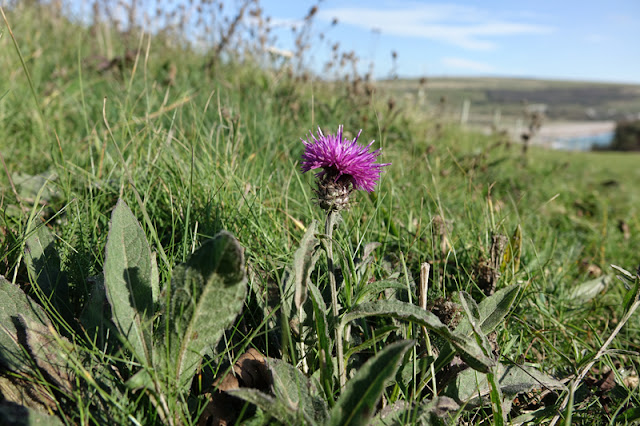Seaford Head Nature Reserve, East Sussex - 24/10/18
This is a Sussex Wildlife Trust managed nature reserve on the west bank of the River Cuckmere and surrounding chalk grassland cliffs. Though this walk was late in the year, it is an excellent wildflower venue so I hoped to discover some late flowering jewels.
This is the view on the walk down to the Cuckmere from the car park.
I found Agrimony in seed, but none flowering, so perhaps I was too late for wildflowers here?
Agrimonia eupatoria
Carline Thistles were also gone over, though when they are in flower they don't look a lot different!
Carlina vulgaris
Flowers that may grow to 2-3 feet at inland or sheltered sites were only a few inches tall here, no doubt due to being exposed to strong coastal storms.
This is a dwarf form of Common Knapweed, but a rayed form. Check the leaves to tell it apart from from Greater Scabious which has lobed lower leaves. Common Knapweed has strap shaped leaves.
Centaurea nigra agg.
In bare places were flowering Scarlet Pimpernels. These can occasionally (though rarely) be found in other colours such as blue, pink or purple.
Anagallis arvensis subsp. arvensis, f. arvensis
A bumblebee on a Greater Knapweed, another dwarf formed plant.
Centaurea scabiosa
A Wild Basil with a single flower still out.
Clinopodium vulgare
Some very small Common Centaury in the chalk turf.
Centaurium erythraea
Wild Carrot, still making lacy patterns.
Daucus carota subsp. carota
Once at sea level there were other habitats to explore. On the shingle by the river were these seeding Rock Samphire.
Crithmum maritimum
Sea Asters were mostly in seed, but I found a clump still in full flower.
Aster tripolium susp. tripolium
Yellow-horned Poppies were on the shingle looming bright and cheerful.
Glaucium flavum
A month ago the area would have been purple with these wildflowers, but now only a few were left flowering.
Rock Sea-lavender
Limonium binervosum
Another lover of salty shingle habitats is Sticky Groundsel
Senecio viscosus
Lesser Sea-spurry
Spergularia marina
Note the lack of bristles on the leaf tips which the similar Sand Spurrey has.
Greater Sea-spurrey with its 10 stamens telling it apart from Lesser.
Spergularia media
Sea Mayweed
Tripleurospermum maritimum
My Grand Daughter taking a break from finding wildflowers for me.
This area is blessed with superb views. Looking across the Cuckmere valley to the well trodden route from the 7 Sisters CP to the sea.
Viper's Bugloss on the way back up the cliffs but on a different route back to the car.
Echium vulgare
Some Gorse coming into flower.
Ulex europaeus
Stinking Iris looks great in flower in May/June, but it also looks great now when the seed pods split to show the seeds.
Iris foetidissima
The tiny yellow flowers of Lady's Bedstraw.
Galium verum
Dwarf Devil's bit Scabious
Succisa pratensis
Wild Thyme
Thymus polytrichus
Butterflies were few and far between, but this Red Admiral brightened up the walk.
Selfheal in the grasses
Prunella vulgaris
Another fine view of the 7 sisters from the clifftops west of the Cuckmere.
It was from here that I found the star find of the day, a plant I had seen before on the chalk grassland of North Kent, but not for a few years now. They were Clustered Bellflowers, but here they were very small with many plant only having a single flower - thus not looking very clustered at all!
Campanula glomerata
The photo below shows how small and stunted these plants were.
Here's a habitat photo for the shingle loving plants from earlier.
I hope you enjoyed the photos.
Regards
Dave
@Barbus59











































Comments
Post a Comment
Comments welcome from those interested in my articles. For spammers don't bother as I moderate all comments prior to posting them.